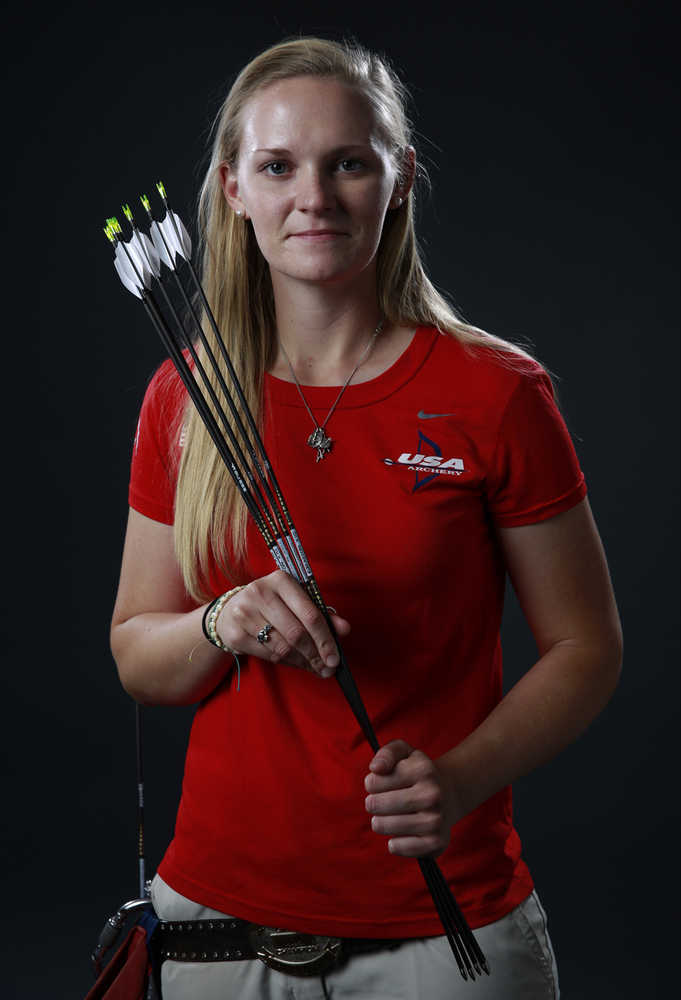The lowdown on American archer Mackenzie Brown: She knits, line dances, used to be a competitive swimmer — backstroke was her specialty — and shoots arrows while listening to country music to hone her concentration.
Then there’s this: The 21-year-old from Flint, Texas, may just be the archer to interrupt the dominance of South Korea, the nation that’s captured seven of the last eight Olympic gold medals in the women’s individual event heading into Rio.
Brown certainly has the aim to pull off the feat — the poise, too.
“If I go in with the right amount of confidence, I’m usually going to do really well,” said Brown, who’s attempting to become the first U.S. woman to win Olympic gold since Luann Ryon in 1976. “I’m my biggest competitor when it comes to that.”
Brown took third at a Rio test event last September at the Sambadrome venue, the iconic stadium designed for the Samba Parade at Carnival. She finished behind winner Choi Misun of South Korea and runner-up Tan Ya-Ting of Chinese Taipei.
“(The stadium) is really catching to the eye,” Brown said. “It’s going to be a really good venue.”
Brown will be the lone American woman competing in Rio after teammates Khatuna Lorig and Hye Youn Park narrowly missed making the Olympic squad. Lorig is a big name in archery circles for what’s she’s accomplished — she was trying to make her sixth Olympic team — and for being the one who enhanced the archery skills of actor Jennifer Lawrence for her role as Katniss Everdeen in “The Hunger Games.”
“I’m just going to do my best and feel like that’s going to earn me a medal,” Brown said.
She grew up a swimmer before being introduced to archery in middle school. From the start, she was talented — winning tournaments in divisions above her age.
“I grew up in deep Texas, where all I heard of was bow hunting. I had this image of the movie ‘Robin Hood: Men in Tights.’ That’s what I knew about archery,” Brown said. “Soon, I found out it was so much more. It was something I definitely have a passion for.”
Typically, she will train to music in order to work on tuning out distractions. When she’s not listening to country stars like Garth Brooks or George Strait, she’s jamming to Meghan Trainor.
“Being able to push that (noise) away and focus on what I need to focus on, it becomes a benefit,” explained Brown, whose hobby is knitting and makes garments to protect her equipment while traveling. “I’m just really looking forward to how things turn out.”
The archery competition starts Aug. 5. Here are some things to know:
Inside scoop
Archery targets are set up 70 meters away — about three-fourths of an American football field — and feature 10 rings with different point values and colors. For scoring purposes, remember this: Gold is great. White, not as much, and missing altogether even worse.
Korean command
The South Koreans have such a deep archery program that defending men’s individual champion Oh Jin-Hyek didn’t make the squad. Also missing from the team is visually impaired archer Im Dong-hyun, who helped the country to a bronze medal in the team event at the 2012 London Games. On the women’s side, Ki Bo-Bae will defend her gold. The South Korean women have also won every gold in the team event since it was included in 1988.
Brazilian hope
Teenager Marcus D’Almeida of Brazil is sometimes referred to as “Archery’s Neymar,” because his quick rise to stardom — much like the soccer great. D’Almeida will be one of the host country’s top medal contenders. The 18-year-old captured a silver medal at the Nanjing Youth Olympic Games in 2014.
American might
The American men have a full team in Brady Ellison, Jake Kaminski and Zach Garrett. Ellison and Kaminski led the U.S. to a silver medal in the team competition at the London Olympics.
Quite an achievement
Zahra Nemati of Iran is scheduled to compete in both the Rio Olympics and Paralympics. The 31-year-old Zahra earned a black belt in taekwondo before she injured her spinal cord in an accident in 2004, according to her profile on Paralympic.org. She took up archery soon after and captured gold at the 2012 London Paralympics in the individual recurve W1/W2.

